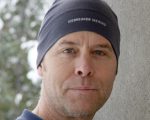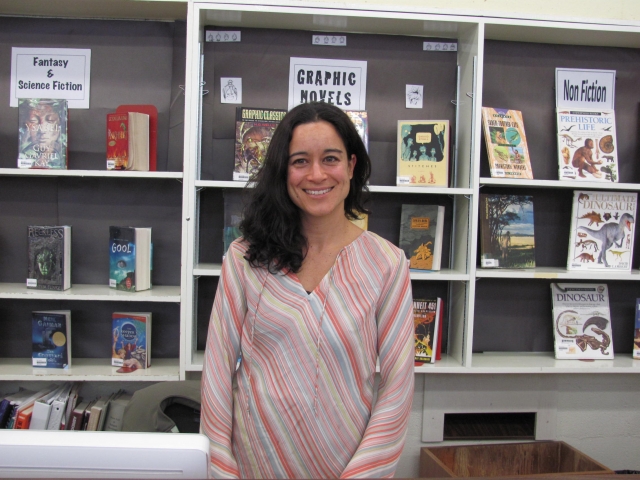Tech-savvy RSS teacher-librarian wins award
Amongst the many things RSS can boast about is the fact that the school now has an award-winning teacher-librarian. Nicola Kuhn was recently selected as the winner of the BC teacher-librarian Association’s BC New Teacher-Librarian of the Year Award and was nominated by former long-time RSS teacher-librarian, and current Crowe teacher-librarian, Marilyn Lunde. The announcement of the award on the BCTLA web site says of Kuhn, “In the less than three years that she has been a teacher-librarian, Nicola has epitomized the qualities of a 21st-Century learner and facilitator. She has embraced a leading role in her school and in the district in focusing on the integration of technology and inquiry-based learning.”
Kuhn originally hails from Vancouver and earned a Bachelor’s Degree in English Literature from McGill University in Montreal. After that, she did her teaching degree at UBC before going on to teach at various locations in BC like Kamloops, Golden, and Bella Coola. She and her husband settled in Rossland because they were attracted to the lifestyle, both of them being big bikers and skiers who enjoy small-town life and clean air.
Currently, Kuhn is halfway through completing her Master’s Degree in Teacher-Librarianship online through the University of Alberta. She believes taking her education further in this way has been the biggest factor in making the changes at the RSS library that she has done during her tenure, as well as garnering her the recognition she’s gotten in the district.
“It’s really important to have trained teacher-librarians,” she says. “A school library is not what it used to be with kids just checking out books and [librarians] helping students do a bit of research with their books. We’re now sort of the conduit between staff and staff and students. So I spend a lot of time teaching staff as well, and they learn through the work that we do collaboratively for their classrooms. I work collaboratively with teachers so that we can plan valuable research projects that go just beyond the facts so that students have a deep understanding. Basically [they] can take information they’ve learned an apply it in a flexible manner to another situation, so it’s not static.” This is called “personal project-based learning.”
In the current elementary and secondary school education landscape, riddled with funding cutbacks and potential school closures, Kuhn is passionate about educating everyone involved with education about the vital role teacher-librarians have in schools today. In fact, she has a paper which is about to be published in The Bookmark (the BCTLA’s journal), about evidence-based practice and the school library.
“This is the idea of, as a teacher-librarian, conducting research in the areas of school libraries and library programs, and inquiry-based learning, and taking that research and applying it to my own practice, and collecting data. I collect data so I can demonstrate to teachers, to students, to administration, to the district what a school library is actually doing. So it goes beyond how many kids check out books, or how many collaborative units I have done. It shows what students have actually achieved over the course of a collaborative unit with me.”
This hard evidence shows how integral the library program is to student learning, which can then be used as ammunition when cutbacks are proposed.
Kuhn says, “This year one of the budget items was to cut teacher-librarians at the elementary school level. So we went to the board, we did a presentation, and we explained all the roles a teacher-librarian has. We’re leaders, we’re advocates, we’re teachers, we’re specialists, so within all those roles it doesn’t make sense to cut one person if they have eight different roles they fill. There is a lot of education that needs to happen around the role of a teacher-librarian.”
And with technology and the internet now such a big part of every day life–and school life especially–it’s extremely important to have a specialist to help students and staff navigate the potentially rough waters of this information age.
The integration of technology in the classroom is one of Kuhn’s specialties and one of the important things she teaches her students is internet safety.
“Students are always a little bit freaked out about how much information is online about them. So we teach them safety. We have to. We can’t just let them sink or swim on their own.” And with information so accessible these days, Kuhn starts as early as grade six teaching about plagiarism, creative commons, and how to suss out proper sources for research purposes. “My job is to teach students how to learn how to learn.” This enthusiastic and passionate teacher-librarian hopes to keep being RSS’s teacher-librarian despite all the talk of closing the school. “RSS has huge potential…I think this whole idea of imminent closures and this whole idea of how to keep it [RSS] going has a silver lining…I think we can look outside the box. If we go K-12, that’s a huge change within the structure, but we can move from four blocks a day. We can look at blended classrooms. [You can] have humanities, where English and Social Studies are working together, meeting the same learning outcomes though more inquiry-based learning, so I think it can be a really good opportunity for Rossland. The community wants a school here, so I think it will happen in some form, and it would be really nice to have support from the school board to go K to 12, or K to 9.”


























